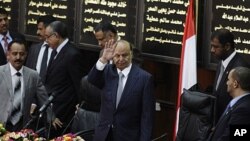Yemen is in the midst of a transition to democracy.
On the heels of the revolutions in Tunisia and in Egypt, the Yemeni people began their own demonstrations. At first, the demonstrations were held against unemployment, economic conditions and corruption, and the government's proposals to modify presidential term limits in Yemen's constitution to allow President Ali Abdullah Saleh to remain in office. Later the protestors began to demand President Saleh’s resignation. Their protest was successful, and a year later, on February 21, 2012, Yemenis went to the polls to choose a new president. Yemen had started on its path to political transition.
The success of that transition will require Yemen to meet a number of serious, complex, and interrelated challenges. Working to help Yemen achieve its goals, the United States has increased its assistance, from $147 million in fiscal year 2011 to 337 million in fiscal year 2012. This is the largest amount of annual assistance provided by the U.S. government to Yemen to date.
There are nearly 550,000 internally displaced persons, over 225,000 refugees, and 140,000 migrants and asylum seekers who are in need of assistance. About half the Yemeni population is in need of food assistance, and nearly one million children under the age of five suffer from acute malnutrition. The United States has significantly increased its humanitarian aid to Yemen in fiscal year 2012 and is delivering funds to provide food supplies, water and sanitation, health care and protection to vulnerable populations.
To improve the livelihoods, economic opportunity and well-being of the Yemeni people, we are supporting small infrastructure repairs and rehabilitation; offering micro-finance and small-enterprise support; improving the health system by renovating health clinics, providing health facilities with basic medical equipment and training midwives and doctors in maternal and child health.
We are also supporting the Yemeni government in its quest to improve security and restore stability; to reform the constitution, the electoral system, laws, and to enhance law enforcement; to reorganize the military and restructure it under civilian control, and hold elections by early 2014.
The United States is committed to supporting the Yemeni people as they undertake their political transition. Through a comprehensive strategy that promotes political, economic, and security sector reforms, we will help the Yemeni people address their challenges and achieve their aspirations.
Assisting The People Of Yemen

Successful transition will require Yemen to meet a number of serious, complex, and interrelated challenges.



